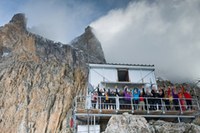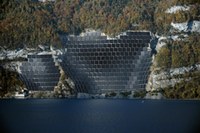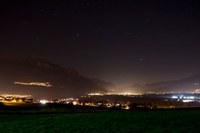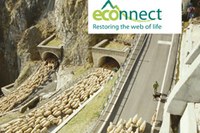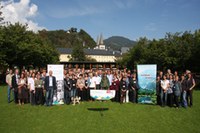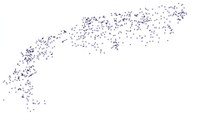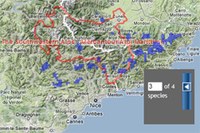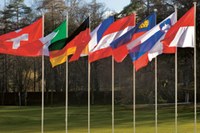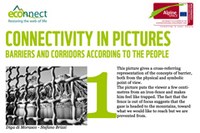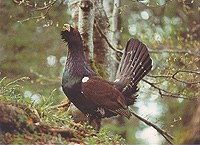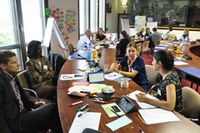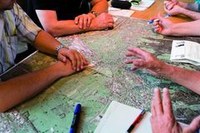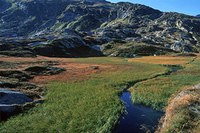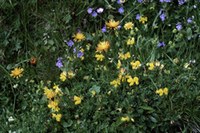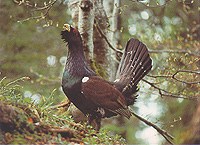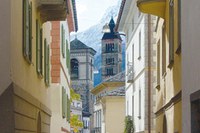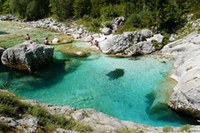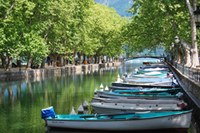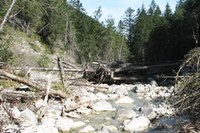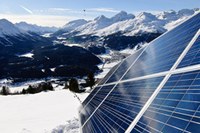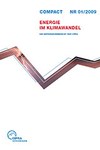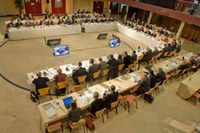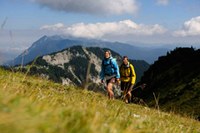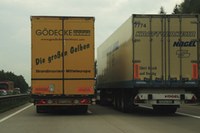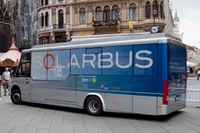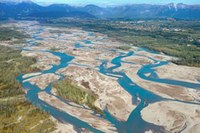Germany
News, publications, press releases, positions... on this page you find current and alpine-relevant information from Germany.
Articles, publications, press releases, CIPRA positions - here you find relevant information on alpine topics from Germany. Please check the other language versions in german, french, italian and slovene for more content.
CIPRA receives the Dutch Sustainability Award
In an on-line ballot, Dutch mountaineers voted CIPRA the 2012 Sustainability Organisation of the Year. This is the first time the Sustainability Award has been made by the Royal Dutch Mountaineering and Climbing Club. Read More…
CIPRA's point of view: An appeal for the mountains
Bigger, faster, further: not even the mountains are immune to this mantra of growth. CIPRA France is thus seeking visions for a sustainable future for both people and mountains. Read More…
Solar installations in Switzerland: innovative yet infuriating
Solar modules on ski lifts and mountain-slopes: the legacy of Fukushima and rising electricity prices mean that creative solutions are needed for power production. We offer a summary of Swiss megaprojects and world premieres. Read More…
Liechtenstein switches the lights out
The first state in the world to go dark: in January and February Liechtenstein is conducting experiments in bird protection, energy efficiency and public safety. Read More…
Improvements in efficiency instead of damage to the environment! cc.alps: CIPRA's demands on the subject of water
The rivers of the Alps provide 170 million people with water. Climate change will greatly reduce the availability of water in the Alps and beyond, with less rain, longer dry periods in summer and greatly reduced snowfalls in winter among the predicted consequences. The demands made of this natural resource will increase accordingly, as will competition between the various user groups. Today only about 10% of the rivers and streams of the Alps can be considered ecologically intact, i.e. they are neither polluted nor over-engineered nor compromised in terms of their flow regimes. The ecological quality of waterways and related habitats therefore calls for improvement, not further impairment. We cannot permit the last rivers to become engineered structures or depleted by the excessive abstraction of water. Read More…
Documentation on ECONNECT results now available
The ECONNECT partners have now compiled their results in a series of publications. There are dedicated reports for ECONNECT's key target groups: all different kinds of stakeholders (final booklet), experts (synopsis, species reports, reports on legal barriers), policy makers (policy recommendations) and practitioners (implementation recommendations). Read More…
ECONNECT's results discussed at the final conference
After three years of research and fieldwork, the ECONNECT project has come to a conclusion. From 26 to 28 September political representatives of the six Alpine countries as well as experts and scientific researchers from local and international institutions attended ECONNECT's final conference in Berchtesgaden, Germany. Read More…
ECONNECT's battle and success with data management
In order to analyse and visualize connectivity on an alpine-wide level as well as on a regional level for the seven Pilot Areas ECONNECT partners needed geographic data. Read More…
Innovative online tools to assess and visualise connectivity
Real connectivity depends on a comprehensive planning process. The complex system of interactions and mechanisms in human societies calls for an analytic and comprehensive approach. Read More…
Alpine barriers and the way they affect species
ECONNECT researchers analysed how barriers affect selected species: lynx, brown bear, wolf, red deer, black grouse, griffon vulture, bullhead and fish otter. For the terrestrial species they found out that altitude and forest availability are the major factors influencing species distribution. Read More…
The promotion of a common Legal Framework
The Alps consist of eight different countries, each of which has its own legal framework. A specific working group provided an overview of the different legislations in force at various governance levels that potentially affect ecological connectivity. Read More…
Connectivity in pictures
Besides classic communication tools such as newsletters and press releases ECONNECT used innovative tools to raise awareness among the general public and the stakeholders. Read More…
Benefit for wood picker, capercaillie and co.
In ECONNECT's Pilot Regions a number of actions were implemented improving connectivity for selected species and habitats. Read More…
Sharing experience to strengthen green infrastructure
How can green infrastructure and its contribution to the provision of a wide range of ecosystem services be strengthened at different spatial scales? An expert workshop on 'Green infrastructure policies and projects' aimed to answer this question. The workshop took place in Brussels on 7 September 2011 and was organised by Ecologic Institute with support from GHK and Institute for European Environmental Policy. Read More…
One step further towards ecological connectivity in France
The French law on ecological networks ("trame verte et bleue") has recently been updated with two decrees, which asses and divide the implementation roles of the state and the regions. Further information: www.actu-environnement.com/ae/news Read More…
Life+ Projects increasing ecological connections along the Alps-Apennines corridor and in Lapland
In the frame of the LIFE+ Nature & Biodiversity programme 2010 two projects regarding ecological connectivity have been implemented. The objective of the project in Lombardy, Italy, is to increase the functionality of the ecological corridor between the Alps and the Apennines. Read More…
NGOs send joint message on the EU biodiversity strategy
A group of 22 nature conservation NGOs, joined in The European Habitat Forum EHF, have expressed their beliefs that increased political effort is required at EU and Member State level to meet the new EU biodiversity target of halting the loss of biodiversity and ecosystem services in the EU by 2020. Read More…
From ecological islands to connected landscapes
Many animals live in particular outside of protected areas; most persons are not aware of the importance of ecological networks; a functioning economy needs biodiversity. These are the most important findings of ECONNECT. The Alpine-wide project came to its end in November 2011 after a bit more than three years of work. Read More…
The Alps are renewed in Poschiavo
On what sort of resources are the Alps building their future? Can climate change be an opportunity? What ought to be done to ensure that young people have prospects? The Alpine Week being held in the Swiss valley of Val Poschiavo from 5 to 8 September 2012 aims to discuss just how renewable the Alps actually are. Read More…
Soča valley soon under water?
The proposal was made by Slovenia's Ministry of Economic Affairs just before the summer break. Five hydroelectric power plants are to be built on the Soča river and its tributaries, the Ucja and Idrijca. Read More…
Annecy is the Alpine Town of the Year 2012
For years now the French town of Annecy has been pursuing a policy of sustainability. As a reward for its efforts the principal town of the Haute-Savoie département and its 53,000 inhabitants have been nominated as the Alpine Town of the Year 2012. Read More…
Green electricity for Liechtenstein
As of next year the electricity flowing out of Liechtenstein's power sockets will be sourced exclusively from renewable energies, but only in private households that do not insist on the previous mix of nuclear energy and fossil fuels. Read More…
Eight new nature parks in Switzerland
The first national park in the Alps was established in the Engadine in 1914. Since then there have been very few efforts in Switzerland to create other protected areas. Read More…
Make the Alps energy self-sufficient! CIPRA-demands - Energy self-sufficient regions
Not having to depend on energy imports: this vision holds great fascination for many regions. Self-sufficiency is "in." There are already many very positive approaches and examples of attempts to go down this road. At the heart of all the concepts is the idea of meeting demand through regional renewable sources of energy, saving energy and using energy more efficiently. Anyone who systematically takes this approach in an attempt to create an energy self-sufficient region changes the face of their region and its structures - to the benefit of their own economy, society and the environment. Read More…
cc.alps: CIPRA's demands for agriculture
The agricultural sector is directly affected by climate change impacts but it also contributes to the release of greenhouse gases (GHG) and rising concentrations of GHG in the atmosphere. A sustainable climate response strategy in the field of agriculture involves anticipating, planning and long-term thinking from farm level to transnational level. Prominent fields of activity are sustainable land and soil management, sustainable water management, managing manure and soil carbon as well as organic agriculture as an overall strategy. As agriculture is a highly subsidized economic sector, subvention policy can be used as a lever to guide the sector to sustainability and climate neutrality. Read More…
The Alpine Region as a macro-region?
The EU already has a macro-region strategy for the Danube Region and the Baltic Sea. So why not also for the Alpine Region? At the beginning of July, the Arge Alp Working Group advocated a resolution calling for a "macro-region for the Alps". Read More…
Climate plan for South Tyrol
The Province of Bolzano wants to become more energy efficient by 2050. Every inhabitant of the Province currently produces around five tonnes of carbon dioxide. The aim is to cut that figure to a mere 1.5 tonnes over the next forty years. Read More…
From road to rail - getting it to work
Crossing Exchange, emissions trading or a differentiated toll system for the Alps: these transport policy instruments could ensure that in future there are fewer HGVs trucking through the Alps - providing the instruments apply to the Alpine region as a whole. Read More…
First solar-powered bus now on the road
Since July Europe's first ever electric bus powered exclusively by solar energy has been operating in Perchtoldsdorf/A. The public transport bus seats up to 35 passengers. Read More…
Respite for the "king of the Alpine rivers"
It looks like no gravel is to be extracted from the Tagliamento for the time being. The company that was planning to extract more than a million cubic metres of ballast between Cimano/I and the Arzino tributary has withdrawn its project. Read More…
